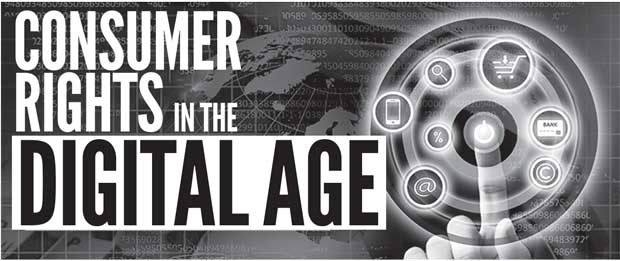Reply To:
Name - Reply Comment
Last Updated : 2024-04-24 11:56:00

 This is the theme of the World Consumer Day celebrating every 15 the day of March since 1983, when President John F. Kennedy made the famous statement that “Consumer by definition includes us all. They are the largest economic group affecting and affected by almost every public and private economic decision, yet they are the only important group whose views are often not heard.” But the situation has tremendously improved since then in USA and Europe and not in Sri Lanka which is far below the standards in terms of exercising of consumer rights by the citizen. World consumerism activism has proved that the consumer and economy would thrive only with a powerful and organized consumer movement in the country using pressure groups directing the State parties to provide the consumer the rights they are entitled to and deserve. Unfortunately the world trends have not influenced consumerism and the consumer in Sri Lanka despite fast growth of the digitalisation, internet, mobile and the social media are as helpless as ever.
This is the theme of the World Consumer Day celebrating every 15 the day of March since 1983, when President John F. Kennedy made the famous statement that “Consumer by definition includes us all. They are the largest economic group affecting and affected by almost every public and private economic decision, yet they are the only important group whose views are often not heard.” But the situation has tremendously improved since then in USA and Europe and not in Sri Lanka which is far below the standards in terms of exercising of consumer rights by the citizen. World consumerism activism has proved that the consumer and economy would thrive only with a powerful and organized consumer movement in the country using pressure groups directing the State parties to provide the consumer the rights they are entitled to and deserve. Unfortunately the world trends have not influenced consumerism and the consumer in Sri Lanka despite fast growth of the digitalisation, internet, mobile and the social media are as helpless as ever.
Currently the consumer is expected to be protected by traditional legal and regular procedures and consumer organizations now not functioning or inactive. Consumer and consumerism - that is consumer activism is a powerful force in the West directing the State, Trader, Industrialist, and the Regulators to protect the consumer and the other sectors to bring about equilibrium in the economy. Unprecedented developments on Technology has bypassed the ordinary regulatory process requiring complete overhaul the field of consumerism in modern directions to meet the demands of the digital age. Currently the consumer is neither protected nor looked after by the State and the organizations including NGOs and INGOs thriving on foreign funds.
Information Technology (IT) is an area that is drastically moving forward transforming the traditional way of protecting the consumer through regulatory process in consumerism to digital area of the human race including consumerism, e-com, e-purchases as a result of fast changes of technology. Lifestyle is fast changing with the increased use of mobile phones, computers, internet, and purchasing locally and via international platforms overlooking the protecting of the consumer and the economy due to unprecedented fast movement of the digital age. While consumer computer penetration is high in the other parts of the world providing free facilities Sri Lanka is foolish in charging initially 25% and about 50% from the mobile phones encouraging citizen to travel instead of using the net for day to day life.
While Tesco, Wall Mart, and similar food chains are thriving locally in Europe, International Giants such as e-bay are dominating the e-sale business via internet and now through the social network spreading worldwide with no restrictions and regulatory procedure, Sri Lanka too has become a victim of e-purchase, Credit Card usage, local and international e-trade and living on debts with unlimited expenditure with extravagant lifestyle. While the corner shops in the United Kingdom -- one time start up units on trade -- are diminishing with the ferocious competition the supermarket giants with their own products at the expense of the small time agriculturists, the same situation has arisen in Sri Lanka with the emergence and popularity of the supermarket chains with their own brands and products and the banks lavishly offering credit facilities and credit cards. Europe and the West with wealthy economies and a powerful social security system can afford living on debts, credit cards and modern way patronising supermarkets and International platforms of mega Marts.
Sri Lankans and the Banking system comfortably and successfully faced the economic and banking “Tsunami”- as a result of cautious and traditional approach when the West underwent destructions periodically due to the western way of livelihood gambling on shares and international trade.
Sri Lanka has 4788751 internet users with 22% of the total population of 2186645 million. Out of the 250 billion global population, there are 250 million internet users. It took 75 years for the internet to reach the target or 50 million whereas Facebook and other social media network took only one year to reach the same target shows how fast the digital age is passing by. World internet users are 3 billion today, when it was only 15% in 1995 penetrated by large percentages worldwide. Sri Lanka has 23 million mobile subscribers, and 3.5 million Facebook fans, stepping into the digital age adopting modern procedures for the day to day life. Social media is fast growing and actively bypassing the traditional ways of communication, publications, and business capable of making drastic changes in the society with incidents spreading viral on the newfound media. What is the position of the consumer and consumerism in the present transitional period and what are the challenges ahead?
Today, the main piece of legislation for the consumer in Sri Lank is the Consumer Affairs Authority (CAA), the main Regulator with enormous powers, to regulate trade under part two of the Act 9 of 2003, with powers to give directions, maintain standards and prosecute errant traders. Initiate dialogue and cooperation between the trader and consumer and the State, power to organize seminars, consumers by setting of consumer organisations, sometimes assume judicial powers. How active the CAA is has become a matter for the consumer, business community and the State to decide based on the impact on living, trade, business and the consumer items the citizen is provided with including the service sector? Some other institutions in action on this area are the trademarks ordinance, poison opium and dangerous drugs ordinance, weights and measures ordinance, food control act, licensing of traders Act, Code of intellectual Act, food Act, Cosmetic devices and drugs Act Consumer credit Act, measurements unit, unfair contract terms Act, local authorities, Health Department, Public Health Inspectors, Bureau of Standards, Insurance and Finance Ombudsman, National Ombudsman, cooperative movement and the Ministry and the department consumer affairs not active and dormant as CAA, the main regulator.
With the battery of powerful institutions, the consumer is still as helpless as the group whose views are not heard and neglected as stated by President Kennedy. Whilst fast approaching the digital age the traditional protectionism would become obsolete when citizens adopt new convenient and fast measures and methods on purchase of items and business. Neither CAA, nor the other institution appear to have addressed the issue in protecting the consumer on new methods adopted in the absence of updated modern regulations with power to protect by the consumer or the establishment.
It is difficult to swim against the tide on the inflow of technology with the fast growth of technology with globalisation and industrialisation with no borders.
The only remedy and the option available may be to adopt ourselves with cautious approach to protect the consumer trade, trader and the industrialist. There could be opportunities and challenges in the transitional process and it is the duty of those concerned and affected to work together for a line of action to avoid disasters in embracing new words on consumerism. Innovations and research replace regulation are matters facing the researchers spending millions in this sphere.
Data collection and data protection is a dangerous area the consumer is not aware of. In areas of insurance, banking, advertisements, and general e commerce the date is collected and shared with others for a consideration or other purposes until the consumer is faced with bill shocks and other complications on litigations and various other demands. Is the information received trustworthy and whether the consumer has access to regulators or any institutional support? Digital products delivered in the process of downloading are not considered tangible goods and are in line with the consumers’ right to redress. so that the consumer is exposed to risks and products not suitable are delivered or not delivered at all.
Free offers and other shady deals and the rampant legal process is expensive, complicated and evasive.
Are consumers protected and looked after by the regulators or organized network of consumer associations and action /active groups like in other parts of the globe? In Sri Lanka, the dilemma faced by the citizen affected by the system and the trader openly exploiting and poisoning the public is the lack of implementation process of the regulatory powers and inactivity of consumer organizations and NGOs busy with more lucrative areas on human rights for foreign funds.
Vegetables and fruits we eat are poisonous, water we drink is polluted and contaminated, Country is full of junk food chains and unhealthy cola drinks, Drugs are free and available to school children near schools, cooked food in outlets is unhealthy and mostly not suitable for human consumption, food and consumer items are of no proper supervision and out of reach of the consumer, Private hospitals are of no slandered and extremely expensive, CAA appear to be a toothless lion, unconcerned or inactive and ineffective and inefficient to meet the expected standards.
It has obviously not addressed the current and future demands at the door step of the digital age. At present the key authority tasked with safeguarding consumer rights is the CAA, however given that digital consumerism also encroaches upon the jurisdiction of ICT and ICT related laws it is important that the CAA work closely with ICT regulator, Telecom Regulator, Insurance and Financial Ombudsman, Chambers of commerce and the Ministry of Consumer Affairs.“Many people wanted the government to protect the consumer though more urgent problem is the protection of the consumer from the inefficient and weak government.- Milton Friedman.” - ”
The author is a former president of CAA and former Ambassador to UAE and Israel and could be reached on sarathdw28@gmail.com
for further discussions.

Add comment
Comments will be edited (grammar, spelling and slang) and authorized at the discretion of Daily Mirror online. The website also has the right not to publish selected comments.
Reply To:
Name - Reply Comment
US authorities are currently reviewing the manifest of every cargo aboard MV
On March 26, a couple arriving from Thailand was arrested with 88 live animal
According to villagers from Naula-Moragolla out of 105 families 80 can afford
Is the situation in Sri Lanka so grim that locals harbour hope that they coul